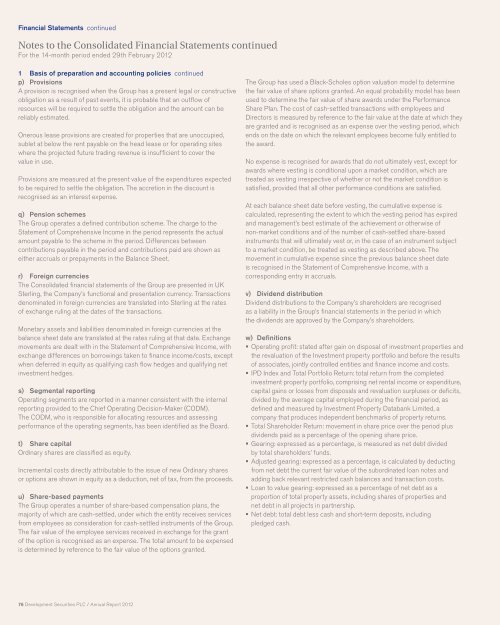Annual Report 2012 - Development Securities PLC
Annual Report 2012 - Development Securities PLC
Annual Report 2012 - Development Securities PLC
You also want an ePaper? Increase the reach of your titles
YUMPU automatically turns print PDFs into web optimized ePapers that Google loves.
Financial Statements continued<br />
Notes to the Consolidated Financial Statements continued<br />
For the 14-month period ended 29th February <strong>2012</strong><br />
1 Basis of preparation and accounting policies continued<br />
p) Provisions<br />
A provision is recognised when the Group has a present legal or constructive<br />
obligation as a result of past events, it is probable that an outflow of<br />
resources will be required to settle the obligation and the amount can be<br />
reliably estimated.<br />
Onerous lease provisions are created for properties that are unoccupied,<br />
sublet at below the rent payable on the head lease or for operating sites<br />
where the projected future trading revenue is insufficient to cover the<br />
value in use.<br />
Provisions are measured at the present value of the expenditures expected<br />
to be required to settle the obligation. The accretion in the discount is<br />
recognised as an interest expense.<br />
q) Pension schemes<br />
The Group operates a defined contribution scheme. The charge to the<br />
Statement of Comprehensive Income in the period represents the actual<br />
amount payable to the scheme in the period. Differences between<br />
contributions payable in the period and contributions paid are shown as<br />
either accruals or prepayments in the Balance Sheet.<br />
r) Foreign currencies<br />
The Consolidated financial statements of the Group are presented in UK<br />
Sterling, the Company’s functional and presentation currency. Transactions<br />
denominated in foreign currencies are translated into Sterling at the rates<br />
of exchange ruling at the dates of the transactions.<br />
Monetary assets and liabilities denominated in foreign currencies at the<br />
balance sheet date are translated at the rates ruling at that date. Exchange<br />
movements are dealt with in the Statement of Comprehensive Income, with<br />
exchange differences on borrowings taken to finance income/costs, except<br />
when deferred in equity as qualifying cash flow hedges and qualifying net<br />
investment hedges.<br />
s) Segmental reporting<br />
Operating segments are reported in a manner consistent with the internal<br />
reporting provided to the Chief Operating Decision-Maker (CODM).<br />
The CODM, who is responsible for allocating resources and assessing<br />
performance of the operating segments, has been identified as the Board.<br />
t) Share capital<br />
Ordinary shares are classified as equity.<br />
Incremental costs directly attributable to the issue of new Ordinary shares<br />
or options are shown in equity as a deduction, net of tax, from the proceeds.<br />
u) Share-based payments<br />
The Group operates a number of share-based compensation plans, the<br />
majority of which are cash-settled, under which the entity receives services<br />
from employees as consideration for cash-settled instruments of the Group.<br />
The fair value of the employee services received in exchange for the grant<br />
of the option is recognised as an expense. The total amount to be expensed<br />
is determined by reference to the fair value of the options granted.<br />
76 <strong>Development</strong> <strong>Securities</strong> <strong>PLC</strong> / <strong>Annual</strong> <strong>Report</strong> <strong>2012</strong><br />
The Group has used a Black-Scholes option valuation model to determine<br />
the fair value of share options granted. An equal probability model has been<br />
used to determine the fair value of share awards under the Performance<br />
Share Plan. The cost of cash-settled transactions with employees and<br />
Directors is measured by reference to the fair value at the date at which they<br />
are granted and is recognised as an expense over the vesting period, which<br />
ends on the date on which the relevant employees become fully entitled to<br />
the award.<br />
No expense is recognised for awards that do not ultimately vest, except for<br />
awards where vesting is conditional upon a market condition, which are<br />
treated as vesting irrespective of whether or not the market condition is<br />
satisfied, provided that all other performance conditions are satisfied.<br />
At each balance sheet date before vesting, the cumulative expense is<br />
calculated, representing the extent to which the vesting period has expired<br />
and management’s best estimate of the achievement or otherwise of<br />
non-market conditions and of the number of cash-settled share-based<br />
instruments that will ultimately vest or, in the case of an instrument subject<br />
to a market condition, be treated as vesting as described above. The<br />
movement in cumulative expense since the previous balance sheet date<br />
is recognised in the Statement of Comprehensive Income, with a<br />
corresponding entry in accruals.<br />
v) Dividend distribution<br />
Dividend distributions to the Company’s shareholders are recognised<br />
as a liability in the Group’s financial statements in the period in which<br />
the dividends are approved by the Company’s shareholders.<br />
w) Definitions<br />
Operating profit: stated after gain on disposal of investment properties and<br />
the revaluation of the Investment property portfolio and before the results<br />
of associates, jointly controlled entities and finance income and costs.<br />
IPD Index and Total Portfolio Return: total return from the completed<br />
investment property portfolio, comprising net rental income or expenditure,<br />
capital gains or losses from disposals and revaluation surpluses or deficits,<br />
divided by the average capital employed during the financial period, as<br />
defined and measured by Investment Property Databank Limited, a<br />
company that produces independent benchmarks of property returns.<br />
Total Shareholder Return: movement in share price over the period plus<br />
dividends paid as a percentage of the opening share price.<br />
Gearing: expressed as a percentage, is measured as net debt divided<br />
by total shareholders’ funds.<br />
Adjusted gearing: expressed as a percentage, is calculated by deducting<br />
from net debt the current fair value of the subordinated loan notes and<br />
adding back relevant restricted cash balances and transaction costs.<br />
Loan to value gearing: expressed as a percentage of net debt as a<br />
proportion of total property assets, including shares of properties and<br />
net debt in all projects in partnership.<br />
Net debt: total debt less cash and short-term deposits, including<br />
pledged cash.






